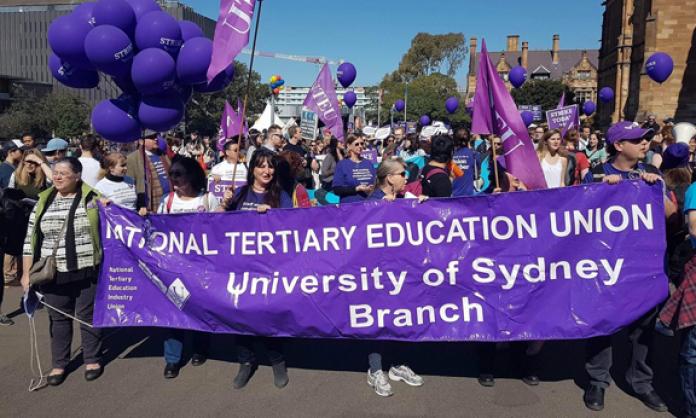In a shock bargaining move, management at the University of Sydney has started a process to side-step the National Tertiary and Education Union. News of the university’s manoeuvre came Monday as a stop work meeting of 250 union members was underway. The meeting had been called to plan a 24-hour campus-wide strike scheduled for 13 September.
In the middle of the meeting, a union member called out that an all staff email had been sent by the vice chancellor. The email asks workers to participate in a poll about a non-union ballot. Anger immediately swept the room and a number of fiery speeches were made. The meeting passed a motion condemning the threat to cut out the union and reaffirming our commitment to strike action. After the meeting, the work began to contact as many people as possible to campaign for a “no” vote in the poll.
The poll is misleading and the implications of a majority “yes” or “no” vote aren’t explained. It asks staff to vote “yes” or “no” to the statement, “I would be prepared to vote in a future formal ballot on the next enterprise agreement that will contain the terms and benefits outlined in the university’s proposals”. However, in a separate email, management confirmed that if enough staff vote “yes”, a ballot will be held to approve an enterprise agreement that does not have the union’s endorsement.
Prior to this announcement, the university’s strategy had been to appear less hostile than it did during the last round of bargaining in 2013. Then, it tried to gut conditions and smash the union but lost after an impressive campaign of industrial action. This time, equally hostile but using less aggressive language, the university has tried to focus on a smaller number of key attacks, including a below inflation wage offer, the introduction of a high number of education-focused academic roles and making it easier to hire and fire professional staff.
Staff have recognised the university’s strategy. More than 95 percent of union members have voted in favour of industrial action. Recent union meetings have been well attended and the success of the union’s Open Day actions shows that union members are willing to fight.
The university’s latest tactical shift may partly be due to Murdoch University’s recent Fair Work Commission victory. University bosses are emboldened by the commission’s decision to terminate the enterprise agreement covering 3,500 Murdoch staff. The precedent has been set and bosses know the decision strengthens their hand during bargaining.
The Fair Work Commission is not our friend. This latest move is a stark warning that we can rely only on our organising power – our ability to withdraw our labour, to win. The branch at Sydney University is the NTEU’s strongest. We can respond to the university’s ploy with a strong and escalating campaign of industrial action. We must engage every member, mobilise them for the strike and picket and involve them in planning for future actions.
The best antidote to the threat of non-union ballot will be a successful strike and picket on 13 September.










